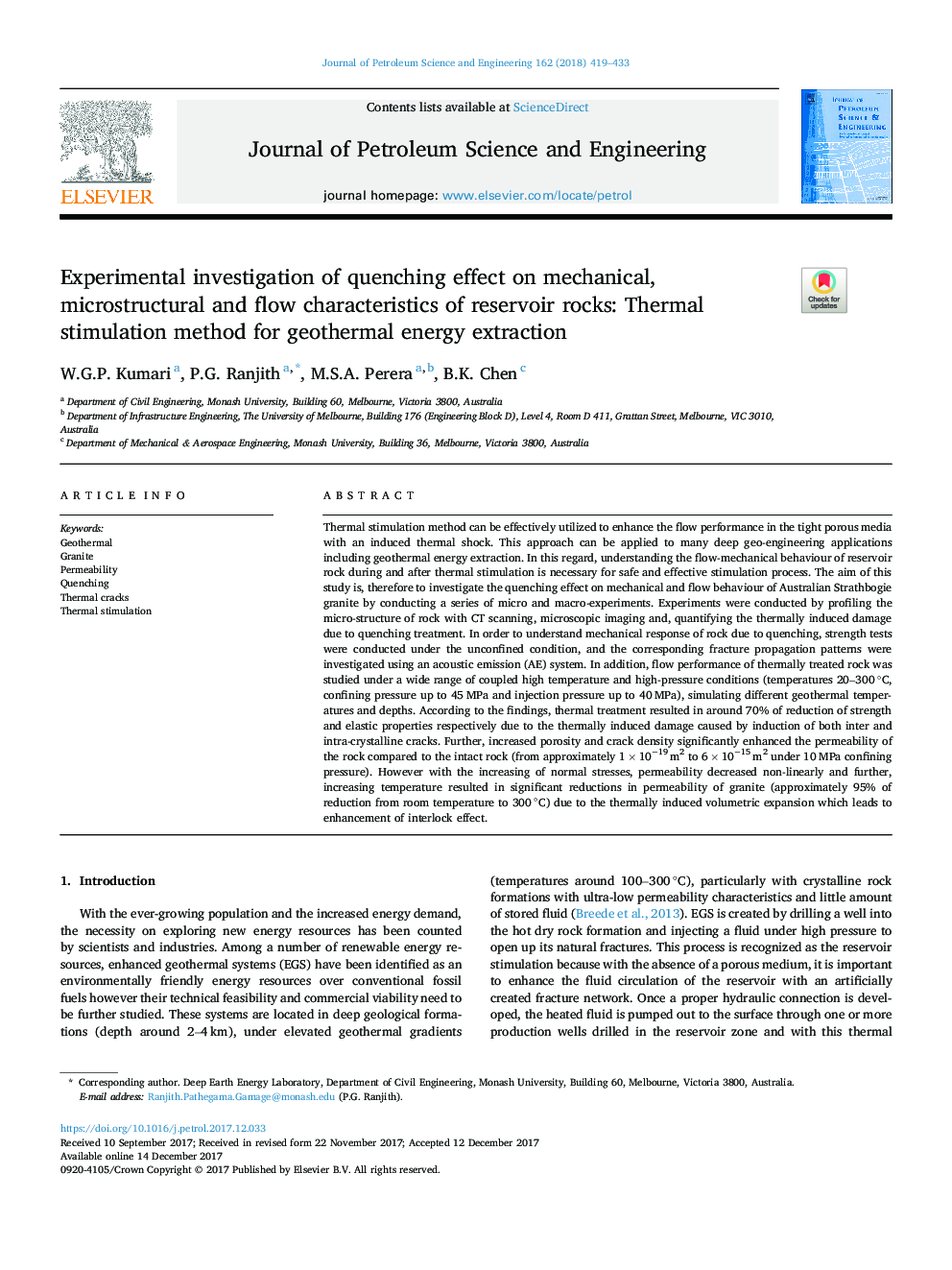| کد مقاله | کد نشریه | سال انتشار | مقاله انگلیسی | نسخه تمام متن |
|---|---|---|---|---|
| 8125434 | 1522779 | 2018 | 15 صفحه PDF | دانلود رایگان |
عنوان انگلیسی مقاله ISI
Experimental investigation of quenching effect on mechanical, microstructural and flow characteristics of reservoir rocks: Thermal stimulation method for geothermal energy extraction
ترجمه فارسی عنوان
بررسی تجربی اثر خشک شدن بر ویژگی های مکانیکی، ریزساختاری و جریان سنگهای مخزن: روش تحرک حرارتی برای استخراج انرژی ژئوترمال
دانلود مقاله + سفارش ترجمه
دانلود مقاله ISI انگلیسی
رایگان برای ایرانیان
کلمات کلیدی
ژئوترمال، سنگ گرانیت، نفوذپذیری، خنک کردن، ترکهای حرارتی، تحریک حرارتی،
موضوعات مرتبط
مهندسی و علوم پایه
علوم زمین و سیارات
زمین شناسی اقتصادی
چکیده انگلیسی
Thermal stimulation method can be effectively utilized to enhance the flow performance in the tight porous media with an induced thermal shock. This approach can be applied to many deep geo-engineering applications including geothermal energy extraction. In this regard, understanding the flow-mechanical behaviour of reservoir rock during and after thermal stimulation is necessary for safe and effective stimulation process. The aim of this study is, therefore to investigate the quenching effect on mechanical and flow behaviour of Australian Strathbogie granite by conducting a series of micro and macro-experiments. Experiments were conducted by profiling the micro-structure of rock with CT scanning, microscopic imaging and, quantifying the thermally induced damage due to quenching treatment. In order to understand mechanical response of rock due to quenching, strength tests were conducted under the unconfined condition, and the corresponding fracture propagation patterns were investigated using an acoustic emission (AE) system. In addition, flow performance of thermally treated rock was studied under a wide range of coupled high temperature and high-pressure conditions (temperatures 20-300â¯Â°C, confining pressure up to 45â¯MPa and injection pressure up to 40â¯MPa), simulating different geothermal temperatures and depths. According to the findings, thermal treatment resulted in around 70% of reduction of strength and elastic properties respectively due to the thermally induced damage caused by induction of both inter and intra-crystalline cracks. Further, increased porosity and crack density significantly enhanced the permeability of the rock compared to the intact rock (from approximately 1â¯Ãâ¯10â19â¯m2 to 6â¯Ãâ¯10â15â¯m2 under 10â¯MPa confining pressure). However with the increasing of normal stresses, permeability decreased non-linearly and further, increasing temperature resulted in significant reductions in permeability of granite (approximately 95% of reduction from room temperature to 300â¯Â°C) due to the thermally induced volumetric expansion which leads to enhancement of interlock effect.
ناشر
Database: Elsevier - ScienceDirect (ساینس دایرکت)
Journal: Journal of Petroleum Science and Engineering - Volume 162, March 2018, Pages 419-433
Journal: Journal of Petroleum Science and Engineering - Volume 162, March 2018, Pages 419-433
نویسندگان
W.G.P. Kumari, P.G. Ranjith, M.S.A. Perera, B.K. Chen,
